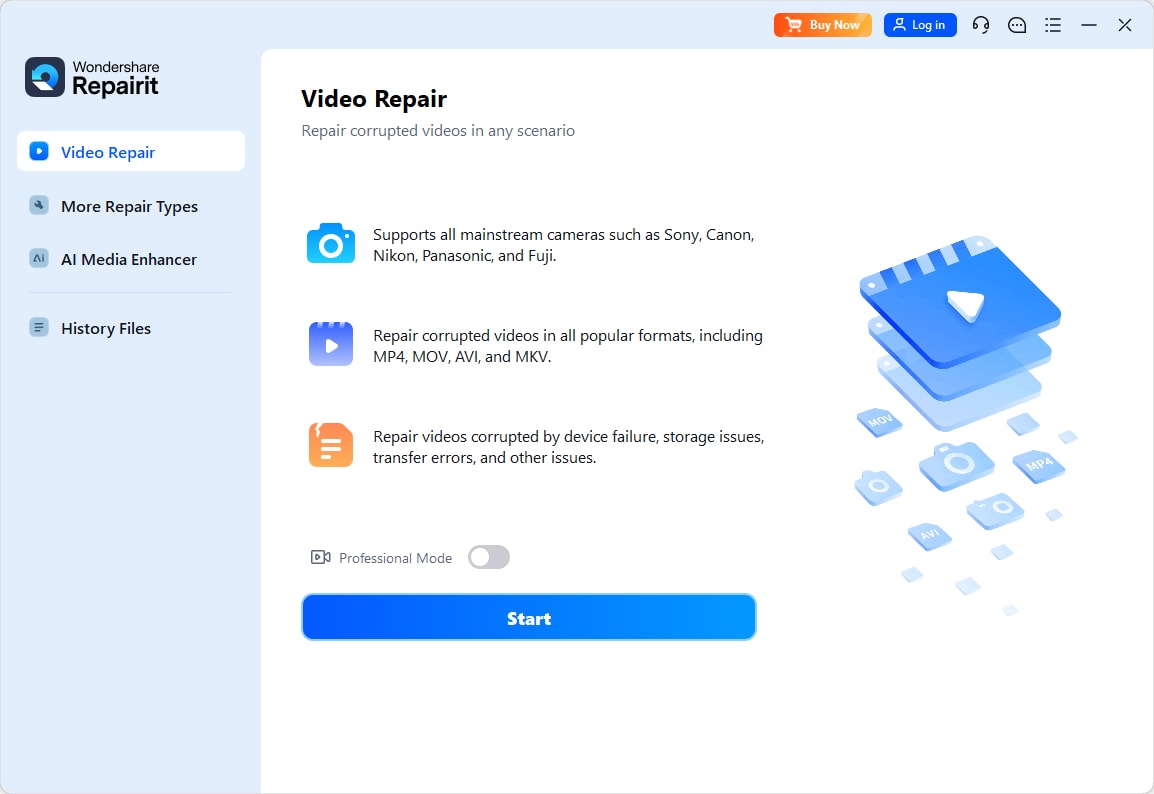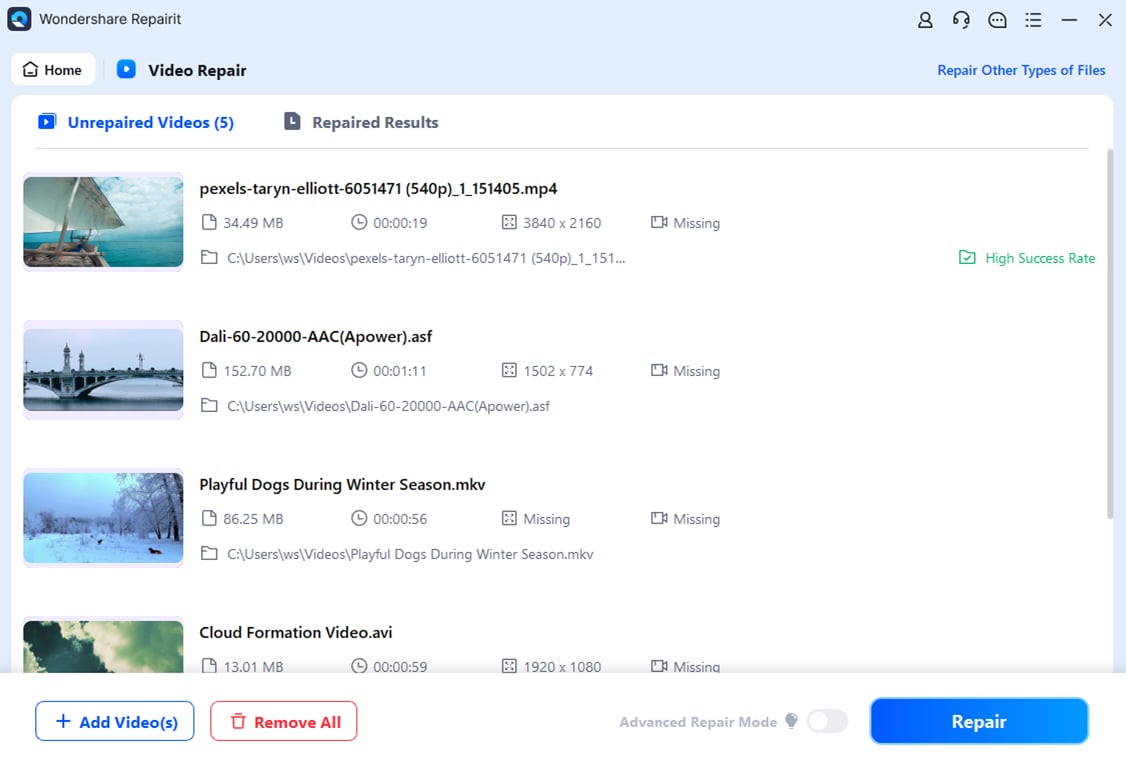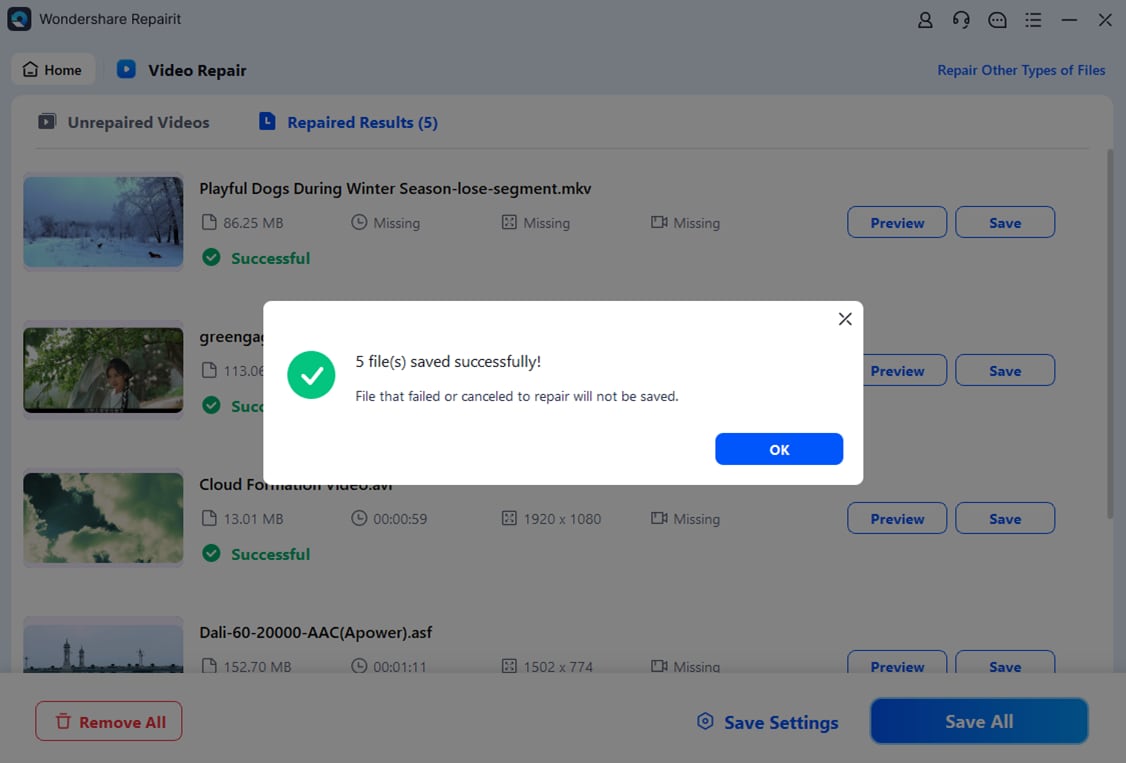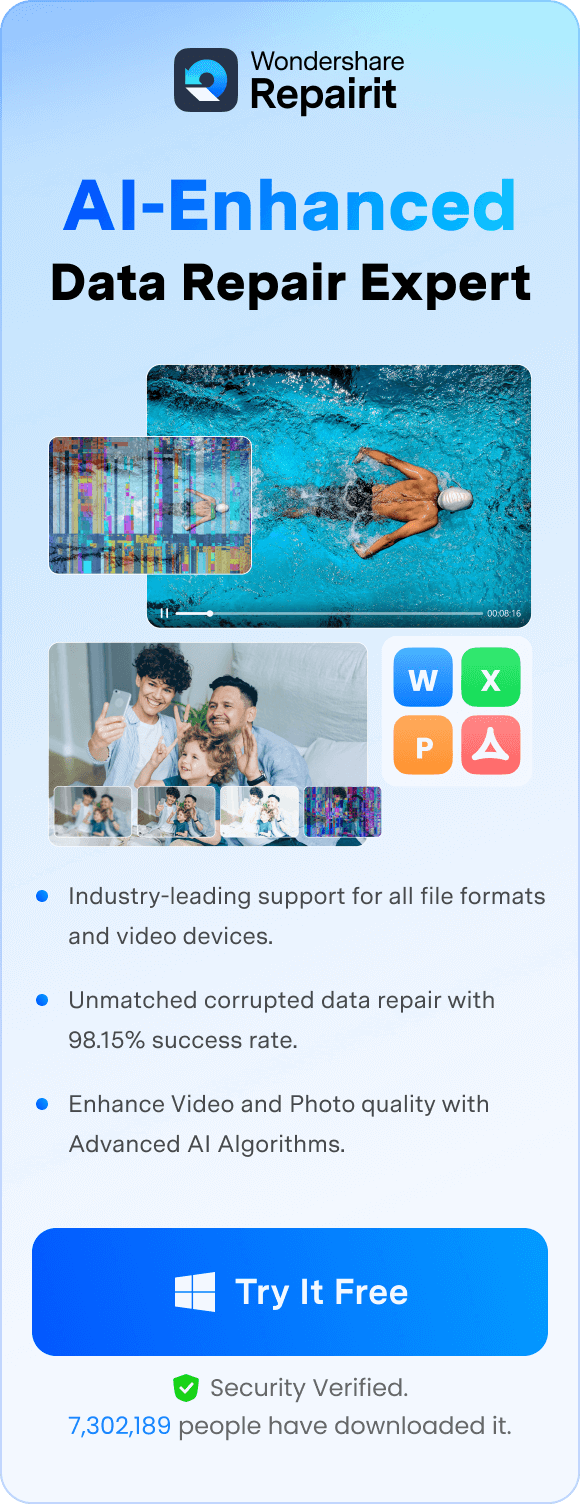RosenPlamz69 shared his problem on Reddit: “I've tried everything, from reinstalling, restarting the program in Task Manager, compatibility settings, updating drivers, everything you could think of. At this point I'm starting to think about uninstalling for good and just using some other software. Any advice? I'm "using" DaVinci Resolve 17.”
Don't give up if you’re facing similar issues with DaVinci Resolve not opening. This article will explore 10 effective solutions to help you get DaVinci Resolve running smoothly.
In this article
- Update The Graphics Driver
- Disable The Default Integrated Graphics Driver
- Uninstall DaVinci Control Panels
- Use Repairit Video Repair [QUICK SOLUTION]
- End The Process in Task Manager
- Rename The Corrupted "Preferences" Folder
- Temporarily Disable the Firewall
- Run The Program Compatibility Troubleshooter
- Uninstall Resolve and Perform a Clean Install
Part 1. Why Do DaVinci Resolve Won’t Open?
Professional video editing software, DaVinci Resolve, was created by Blackmagic Design. It’s widely used in the film and television industry for color correction, visual effects, and audio post-production. DaVinci Resolve offers both free and paid versions, which is accessible to a wide range of users.
If you know, DaVinci Resolve not opening is a trouble if you didn't fix it sooner. Here are a few typical explanations for why this might be occurring:
- Insufficient System Requirements. DaVinci Resolve is a resource-intensive application. If your computer doesn’t meet the minimum system requirements, the software may struggle to launch or run properly.
- Outdated or Incompatible Drivers. Drivers, especially for your graphics card, play a crucial role in running DaVinci Resolve. Outdated or incompatible drivers can prevent the application from opening.
- Corrupt Installation Files. If the installation files of DaVinci Resolve are corrupted, the software may fail to launch. This can happen due to interrupted downloads or issues during the installation process.
- Incorrect Configuration Settings. Sometimes, incorrect settings or preferences within DaVinci Resolve can cause it to fail to open. This can happen if there were changes made to the software’s configuration files.
- Operating System Issues. Your operating system itself might have issues that prevent DaVinci Resolve from running. This can include missing updates, corrupted system files, or other OS-related problems.
- Software Updates and Patches. If you haven’t updated DaVinci Resolve to the latest version, there might be bugs present in the older versions that are preventing it from opening.
Part 2. 10 Solutions to Fix DaVinci Resolve Not Opening Issue
In this part, we’ll cover ten effective solutions to resolve the startup issues with DaVinci Resolve. Let's get started and work our way through to ensure your DaVinci Resolve opens.
1. Update The Graphics Driver
Drivers are essential for allowing components, like the graphics card, to communicate with the motherboard and the operating system (OS). Without drivers, the graphics card won’t work. Sometimes, drivers can get corrupted or removed, or you might be using outdated drivers, which DaVinci Resolve can’t recognize.
To upgrade your graphics card drivers, follow these steps:
Step 1. Click the magnifying glass icon in the taskbar and type “Device Manager.” Alternatively, right-click the “Start” button and select “Device Manager.”

Step 2. Expand “Display Adapters” and update each graphics card driver listed. Choose "Update driver" when you right-click on the drivers.

Step 3. Click “Search automatically for updated driver software,” and it will find and install the latest drivers for your PC.

2. Disable The Default Integrated Graphics Driver
DaVinci Resolve needs a discrete GPU as one of its minimum system requirements. Sometimes, Resolve might have trouble recognizing your discrete GPU. If this happens, follow these steps:
Step 1. Open the “Control Panel” and click on “Device Manager.”

Step 2. Click on “Display Adapters.”
Step 3. Right-click on your Integrated Graphics (like AMD Radeon(TM) Graphics) and disable the driver.

This will force DaVinci Resolve to use your discrete GPU (such as Nvidia GeForce GTX 1650 Ti).
3. Uninstall DaVinci Control Panels
You might forget to uncheck the “DaVinci Control Panels” option during the DaVinci Resolve installation. A control panel is a hardware device; if Resolve looks for this device when it launches and can't find it, it won’t open.
Here’s how to fix it:
Step 1. Click on the Windows Start button. Type “Apps and Features” and click on it.

Step 2. Find “DaVinci Resolve Control Panel” in the list.
Step 3. Click on it and then click “Uninstall.”

Now, DaVinci Resolve should open successfully.
4. Use Repairit Video Repair [QUICK SOLUTION]
If you are experiencing issues with DaVinci Resolve not opening, one of the quickest solutions is to use Repairit Video Repair. This tool is perfect to fix various video-related problems, including those that might be preventing DaVinci Resolve from launching. You can have this video repair tool on Windows and Mac devices. Here's how to use it:
Step 1. Download Wondershare Repairit. Press the +Add button within the Video Repair section.

Step 2. Add your corrupted DaVinci Resolve video files. Repairit offers batch processing. Thus, you can add multiple at once. To begin the video repair process, kindly click the Repair option.

Step 3. Click the Preview button to view the repaired DaVinci Resolve video file. If you think that the repaired file is good, click Save.

Fix DaVinci Resolve Not Opening Issue

5. End The Process in Task Manager
After launching Resolve, you might see a tiny blue circle loading next to your cursor, which soon disappears, but Resolve never starts. This happens because a previous session of Resolve is still running and needs to be stopped.
Here's how to fix it:
Step 1. Open Task Manager.

Step 2. Go to the “Details” tab. Find “Resolve.exe”.
Step 3. Right-click on it and select “End Task.”

Now, try launching Resolve again, and it should open.
6. Rename The Corrupted "Preferences" Folder
A corrupted “Preferences” folder can sometimes stop DaVinci Resolve from opening. This folder stores important settings and configurations for the software. Resolve can't access the necessary information to start properly when it becomes corrupted. Here’s how to fix it:
Step 1. Use the Windows key plus "e" to launch Windows Explorer.
Step 2. Click on the “View” tab.
Step 3. Check “Hidden Items” and “Image name Extensions” to ensure you can see all files.

Step 4. Navigate to “C:\Users< USERNAME>\AppData\Roaming\Blackmagic Design\DaVinci Resolve”.
Step 5. Rename the “Preferences” folder to “Preferences. orig” or “Preferences.bad”. Now, launch Resolve. It should open.

7. Temporarily Disable the Firewall
DaVinci Resolve isn't opening; your internet connection or firewall settings might be causing the problem. To troubleshoot this, try the following steps:
Step 1. Temporarily disable the firewall. Go to “Windows Start" and Settings.
Step 2. Next, search for Security and Update.

Step 3. Afterward, go to the Windows Security, and Firewall and Network Protection to turn off the networks.

Try to launch DaVinci Resolve. If DaVinci Resolve opens successfully, you might need to add an exception to the firewall settings.
8. Run The Program Compatibility Troubleshooter
Sometimes, Resolve might have compatibility issues with Windows. This can be due to various reasons, such as updates to the software or the operating system that aren't fully synchronized.
So, here are the steps to troubleshoot and fix compatibility issues:
Step 1. Go to where Resolve is installed on your system, usually "C:\Program Files\Blackmagic Design\DaVinci Resolve."
Step 2. Find "Resolve.exe" and right-click on it (make sure it's the original .exe, not a shortcut). Click on the "Compatibility" tab.
Step 3. Click on "Run compatibility troubleshooter."

Step 4. Under "Select troubleshooting option," select "Try recommended settings."

Step 5. In the window that appears, click the "Test the program" button.

Step 6. The program will try to open in Windows.
Step 7. If Resolve opens successfully, click "Next," then click "Yes, save these settings for the program."

Step 8. The "Troubleshooting has completed" window will appear. Click "Close the troubleshooter."

Step 9. The next time you launch Resolve, Windows will remember the settings and start the program successfully.
If "Try recommended settings" doesn't work, click "Troubleshoot program" and try the options individually to see which works.

If these steps don't work, then:
Step 1. Right-click "Resolve.exe" and click on the "Compatibility" tab.
Step 2. Under "Compatibility mode," check "Run this program in compatibility mode for:" and select the required OS.
Step 3. Try clicking "OK" to see if that resolves the problem.

9.Uninstall Resolve and Perform a Clean Install
Uninstalling and reinstalling software can sometimes be necessary to resolve persistent issues. If you're having trouble with DaVinci Resolve on your Windows or Mac system, a clean reinstallation might be the solution. Here's a simple guide to help you completely remove DaVinci Resolve and reinstall it.
Uninstall DaVinci Resolve:
Step 1. Go to the “Control Panel” and click “Programs” to find “Programs and Features.”

Step 2. When you do a right-click on "DaVinci Resolve," choose "Uninstall."

This should completely remove Resolve from your Windows system. Follow the same steps for MacOS.
Reinstall DaVinci Resolve:
Step 1. Double-click on the installer for your required Resolve version (use "Run as administrator" if needed).
Step 2. Uncheck other options like “DaVinci Control Panels” and check only “DaVinci Resolve < version number>.”
Step 3. Click Install and follow the instructions to complete the installation. Launch DaVinci Resolve.

Step 4. If the application shows a “Welcome Tour,” Resolve has been cleanly installed. You can click “Skip Tour” until you see the splash screen.

Resolve should now open successfully.
Conclusion
Following these solutions, you should be able to troubleshoot and resolve the issue of DaVinci Resolve not opening. Each step targets a specific potential cause, ensuring your software can run smoothly again.
FAQ
What are DaVinci Resolve's minimum system requirements?
The minimum system requirements include at least 16GB of RAM, a discrete GPU with at least 2GB of VRAM, and a multi-core processor. It’s also essential to have the latest drivers installed for your GPU.Can I use DaVinci Resolve with integrated graphics?
While it’s possible, DaVinci Resolve performs best with a discrete GPU. Integrated graphics might not provide the performance needed for smooth operation, especially with complex projects.How often should I update DaVinci Resolve?
It’s advisable to keep DaVinci Resolve updated to the latest version. New features, performance enhancements, and bug fixes are frequently included in updates.


 ChatGPT
ChatGPT
 Perplexity
Perplexity
 Google AI Mode
Google AI Mode
 Grok
Grok

